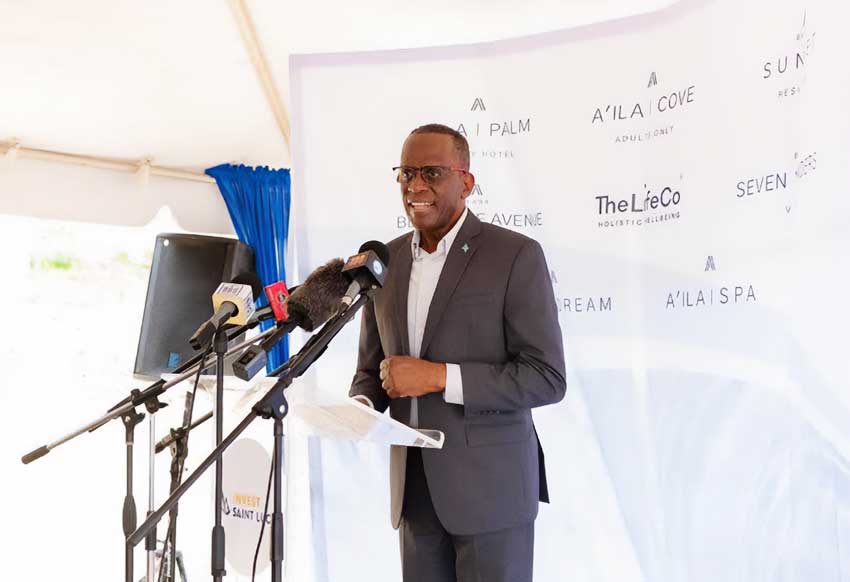
Prime Minister Philip J Pierre disclosed that the Saint Lucia government has decided to follow suit and sign the Memorandum of Agreement (MOA) which guides the Citizenship by Investment Programme (CIP) in agreement with Organisation of Eastern Caribbean States (OECS) that have signed the document.
In what appears to be a deliberate and calculated move by the administration, Saint Lucia is now poised to support the recommended processes as laid out by the sub-regional member states.
Over the last week, the CIP furor involving some entities within the OECS and including Saint Lucia, has been highlighted in local and regional media circles. Notably, an independent investor signaled an intention to file a lawsuit against some sub-regional CIP facilitators claiming there were certain infringements relating to ‘underpricing’ of CIP passports.
PM Pierre responded to the allegations stating that it was the case of a private investor venting his grouses, and the matter was not related to a “government investigation.”
The MOA cited some common standards and procedures in the following areas which includes Pricing, Information Sharing and Transparency Standards, Regulation, Security Screening and Framework, Regulation of Agents, Marketing & Promotion of Programs, Joint Training and Capacity Building, Dispute Resolution, and Amendment and Termination.
“In addition to signing this Memorandum, Saint Lucia has made further suggestions to strengthen this regional agreement including proposing legislative changes to address change of name requests,” the prime minister noted.
He said other OECS Heads of Government have consented to review the recommendations put forward by Saint Lucia.
“After consultations are completed with regional governments and other partners, the Government of Saint Lucia will suggest further strengthening of the CIP programme,” Pierre added.
These recommendations would include an annual quota, a net-worth for applicants, Escrow accounts to be held in Saint Lucia or in the individual islands, and a requirement that only licensed promoters will be allowed to submit applicants to local authorized agents and these promoters will have to submit a due diligence report on each applicant.
PM Pierre reiterated that Saint Lucia has demonstrated and continues to practsie “due diligence” with this critical CIP undertaking.
He said over the last year, Saint Lucia’s Citizenship by Investment Unit has instituted all six principles agreed to with the United States Government.
These issues include; from February 15, 2023 – ban on applicants from Russians and Belarusians, from September 4, 2023 – implemented applicant interviews, from September 4, 2023 – vetting of all applicants through the local Financial Intelligence Authority, from January 2020 – sharing of denials with the Joint Regional Communication Centre (JRCC), an operational review of the programme by an international consultancy firm which will commence shortly; the Saint Lucia CIP Unit will seek international support with the recovery of revoked passports.
Additionally, said Pierre, “the Saint Lucia CIP Unit publishes an Annual Report that is tabled in Parliament which includes audited financial statements.”
And furthermore, “the fee structure for different options are published in the Official Gazette.”
He asserted: “The Government of Saint Lucia remains committed to maintaining and reinforcing the integrity of its CIP programme with a transparent and accountable process that delivers tangible benefits to all Saint Lucians.”
PM Pierre noted that while other OECS countries benefited substantially from the CIP initiative from 2016 to 2021, Saint Lucia acquired no “tangible benefits” from the CIP.
He listed countries like the Republic of Dominica, Antigua and St Kitts/Nevis among countries that have benefited from infrastructural projects, to include the construction of roads, residential houses and hotel property.
“With the infrastructure programs (that) we are negotiating,” the prime minister added, “there would have been tangible benefits …you would see roads (built) and houses going up.”
However, he said, during the period (2016 to 2021), and before and after the Covid19 pandemic, “you didn’t see anything happening,” while other countries have constructed hotels in the region.
He mentioned that the Range Hotel was built in Dominica and the Secrets Hotel in Grenada, while St Kitts/Nevis was also involved in infrastructural works.





![Attendees at the UHC logo and website launch [Photo credit: GOSL]](https://thevoiceslu.com/wp-content/uploads/2026/02/Attendees-at-the-UHC-logo-and-website-launch-380x250.jpg)






![Remnants of an alleged drug boat blown up in a lethal strike by the U.S. military last week surfaced off Canouan on Saturday [Photo credit : St Vincent Times]](https://thevoiceslu.com/wp-content/uploads/2026/02/Remnants-of-an-alleged-drug-boat-blown-up-380x250.jpg)
